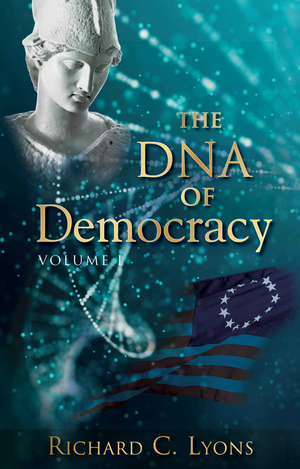
A comprehensive analysis of democracy and its ideals since inception doesn’t immediately sound like a riveting read, but The DNA of Democracy by Richard C. Lyons is like no other history, work of anthropology, or political science book you’ve read before. With an informal voice and the ability to never take the subject too seriously, Lyons presents an impressive and insightful look at the trials and tribulations of human societies as we’ve attempted to find purpose and make peace.
The scale and scope of this book are initially daunting, but Lyons lays out an intuitive framework and explains the angle he hopes to take in the book. By drawing parallels between the entangled nature DNA and the intrinsic presence of both tyranny and democracy throughout history, he provides an accessible entrance to a typically challenging subject. There isn’t a huge market for cross-disciplinary historical texts outside of certain academic niches, but in the same spirit as Jared Diamond and Yuval Noah Harari, Lyons outlines complex subjects in digestible portions.
Lyons’ study has a particular focus on tyrants, the historical events that led to their rise, and their eventual fall from power, which makes the book feel particularly timely given the recent swell of nationalism and a resurgence of strongmen coming to power across the world. The depth of research and peripheral history around certain time periods is highly compelling, and there’s simply no way to read this book and not walk away with a richer understanding of humanity’s past.
Lyons hasn’t written a comprehensive new history, but rather an abridged version through the lens of democracy, containing only the most interesting and critical moments. Taking anecdotal snapshots from Israel, Greece, Egypt, Rome, and many other ancient cultures, readers are led by the hand through the rise and fall of empires, while key markers along the way – both good and bad omens – are pointed out and their significance is explained.
As the course of history moves into Europe and the divine right of kings becomes an even more prominent source of human misery, readers will begin to recognize the signs of rot that have afflicted so many tyrants and cruel dominions. The patterns are laid out clearly, and rarely has the phrase “history repeats itself” been so prescient. Remarkably, the casual nature of the author’s storytelling style makes this a thoroughly enjoyable read, despite the density of information and the nearly 400 pages.
At times, Lyons’ informal style undercuts his own authority on the subject. His recounting of certain historical interactions should stand alone, without his offhand commentary or attempts at subtle humor. There is an appropriate time for his sardonic commentary, and it should occasionally have been reined in further. That being said, this is an academic text like no other, leading readers towards profound realizations and laughter at the same time. As a work of popular history, the book most certainly succeeds.
Given the world around us, and the tumultuous 21st century thus far, this book serves as a reminder that there are signs along the long path of history to which we can refer, as well as essential forks in that road that will lead us towards salvation or suffering. Lyons captures the reader’s imagination with The DNA of Democracy in a way that few books of this genre can.
Book Links
STAR RATING
Design
Content
Editing
Get an Editorial Review | Get Amazon Sales & Reviews | Get Edited | Publish Your Book | Enter the SPR Book Awards | Other Marketing Services























Leave A Comment